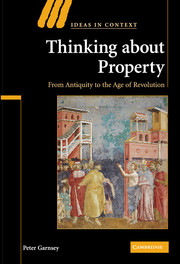Book contents
- Frontmatter
- Contents
- Abbreviations
- Preface
- Introduction
- Chapter 1 Plato's ‘communism’, Aristotle's critique and Proclus' response
- Chapter 2 Plato's ‘communism’: from late antiquity via Islamic Spain to the Renaissance
- Chapter 3 Renunciation and communality: thinking through the primitive Church
- Chapter 4 The poverty of Christ: crises of asceticism from the Pelagians to the Franciscans
- Chapter 5 The state of nature and the origin of private property: Hesiod to William of Ockham
- Chapter 6 The state of nature and the origin of private property: Grotius to Hegel
- Chapter 7 Property as a legal right
- Chapter 8 Property as a human right
- Conclusion
- Bibliography
- Index
Conclusion
Published online by Cambridge University Press: 22 September 2009
- Frontmatter
- Contents
- Abbreviations
- Preface
- Introduction
- Chapter 1 Plato's ‘communism’, Aristotle's critique and Proclus' response
- Chapter 2 Plato's ‘communism’: from late antiquity via Islamic Spain to the Renaissance
- Chapter 3 Renunciation and communality: thinking through the primitive Church
- Chapter 4 The poverty of Christ: crises of asceticism from the Pelagians to the Franciscans
- Chapter 5 The state of nature and the origin of private property: Hesiod to William of Ockham
- Chapter 6 The state of nature and the origin of private property: Grotius to Hegel
- Chapter 7 Property as a legal right
- Chapter 8 Property as a human right
- Conclusion
- Bibliography
- Index
Summary
It may not be a natural or human right to own property, but it is no accident that humans in complex societies strive assiduously to acquire, possess and attach the label ‘mine’ to external objects that are felt to be needed or seen to be of value. Aristotle was reflecting the communis opinio, then as now, when he claimed that a private property regime was preferable to one of communal ownership. His specific arguments, too, have struck a chord with theorists and politicians down the ages. They are primarily utilitarian: private property makes good social and economic as well as moral sense. It is important however not to overlook two other aspects of his intervention: first, the fact that he spoke out at all, and second, the fact that he misrepresented Plato in the course of doing so.
On the first of these points: Aristotle was provoked by the arrangements that Plato prescribed for his ideal state. It was the same with slavery (though in this case Plato was not the provocateur). There is no reason to suppose that Aristotle would ever have produced his theory of natural slavery, had not its basis been queried by certain (unnamed) individuals. Private property was an even more firmly established institution in Greek society than was slavery.
- Type
- Chapter
- Information
- Thinking about PropertyFrom Antiquity to the Age of Revolution, pp. 233 - 237Publisher: Cambridge University PressPrint publication year: 2007



